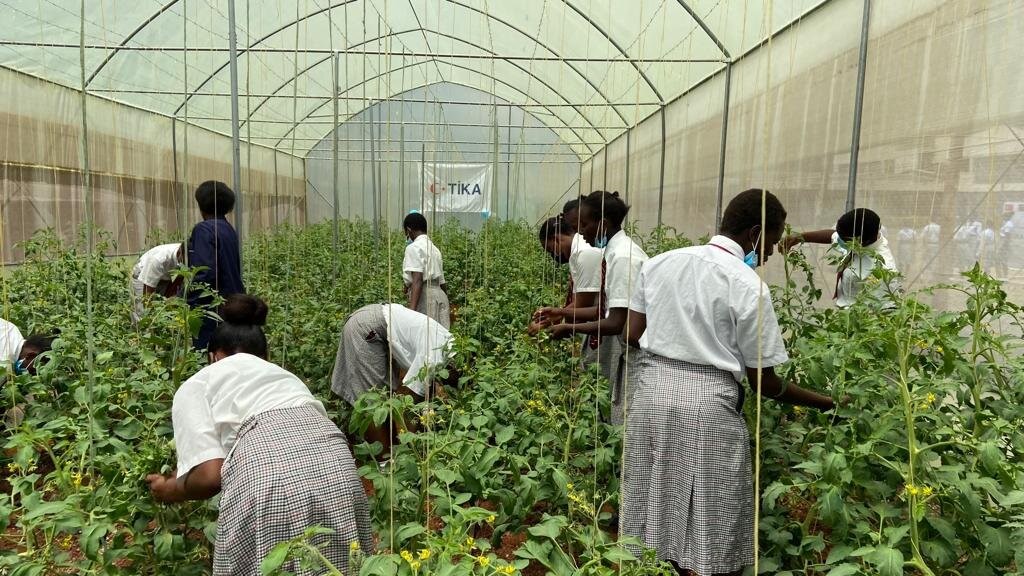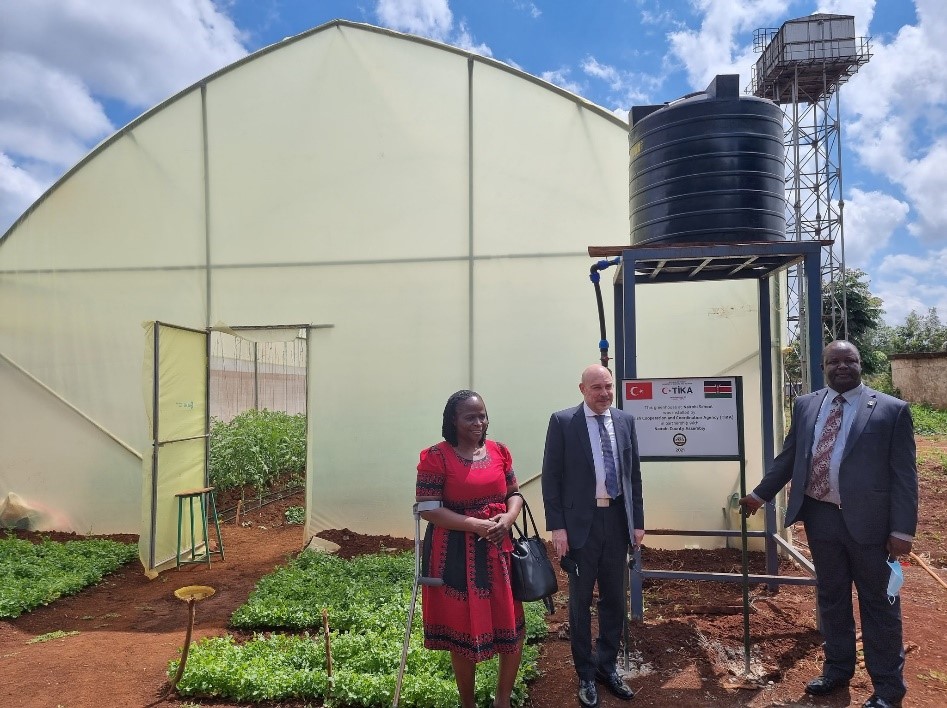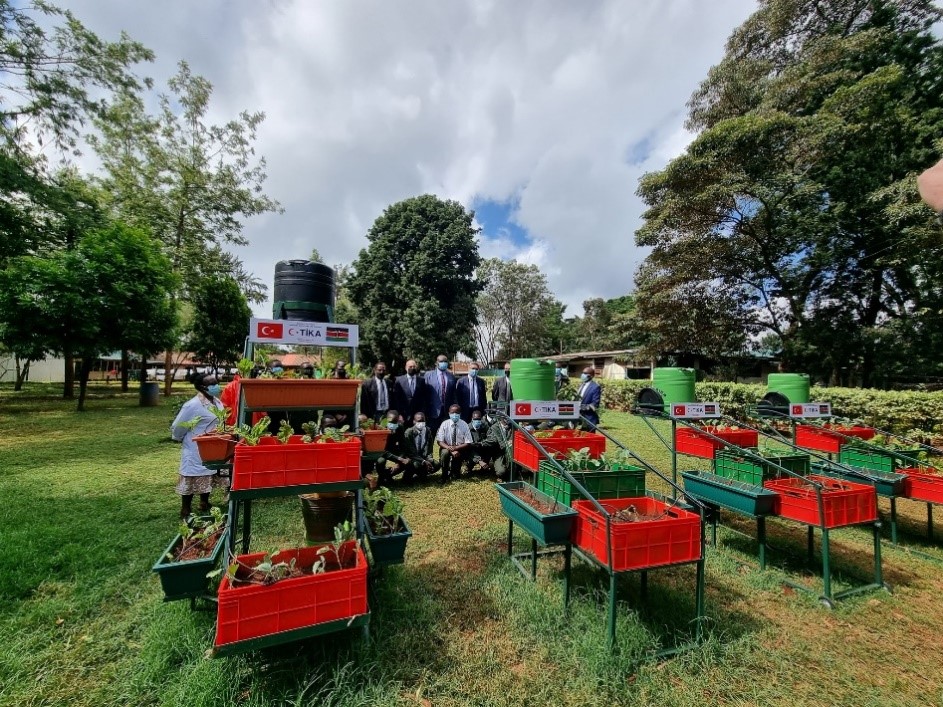 Micro-gardening and Greenhouse Construction
Innovative model uses micro-gardening, drip irrigation and greenhouses to improve agricultural capacities and production
Micro-gardening and Greenhouse Construction
Innovative model uses micro-gardening, drip irrigation and greenhouses to improve agricultural capacities and production

Challenges
Agriculture is a key economic sector in Kenya, making up 33 percent of the nation’s gross domestic product (GDP), and is an important source of food supplies to the country. However, agricultural production in Kenya faces many challenges, including climate change (such as changes in precipitation and long periods of drought), outdated technologies, lack of sufficient equipment, shortage of arable land, disease, pests, lack of theoretical knowledge and limited access to markets. Solutions that are sustainable, adaptable and innovative are needed to overcome these barriers to efficient and optimal agricultural production in Kenya.
Towards a Solution
To address the challenges above, the TİKA Nairobi Programme Coordination Office implemented the Greenhouse Construction and Micro-Gardening project which introduces a micro-model that supports practical and theoretical knowledge on adaptable solutions for better agriculture production.
The project was implemented at four boarding high schools (two girls’ schools and two boys’ schools) for agricultural production in Nairobi, Kenya. The project provided the schools with greenhouses, drip irrigation systems, water tanks, plant support systems, tomato seedlings, micro-gardening units, protective clothing, pesticide spraying equipment and school benches. Students in young farmers’ clubs were trained on greenhouse production and gained theoretical and practical agricultural knowledge.
The project partner, Nairobi City County Assembly, has a mission of advancing economic, social, cultural and political aspirations of the people of Nairobi City County through robust legislation, prudent oversight and responsive representation. The Agriculture Committee at the Nairobi City County Assembly regularly monitors the project and advises the schools accordingly. The outcomes thus far have shown the project to be successful.
The first harvest at the schools was used to feed students, teachers and other school staff. The students in the Agriculture and Young Farmers Club are continuously gaining both theoretical and applied knowledge and skills on agriculture production through maintaining the greenhouse and micro-gardens. This project creates immediate knowledge transference from teachers to students, raising awareness among parents and eventually spreading out into the larger community. Furthermore, this project has shown characteristics of easy replicability in terms of adoption of greenhouses by parents and teachers on their farms, as well as adoption of micro-gardening units in the balconies of their houses.
This is the first micro-gardening project in schools in Kenya. Using drip irrigation systems for the micro-gardens is an added value of the project. As an indirect outcome, a supermarket chain is selling the micro-gardening units with drip irrigation systems to customers who would like to implement the project in their own homes and gardens.
The project supported the high school students to access adequate and safe nutrition from fresh fruits and vegetables and decreased their spending on food. These goals are in line with SDG 2 (zero hunger). The project provided opportunities to generate income for the high school students contributing to SDG 1 (no poverty), SDG 8 (economic growth) and SDG 4 (quality education). The project model was easy to adopt, creating a conducive environment for individuals (especially students, their parents and teachers of the beneficiary schools) to adopt the new techniques and practices. As the number of people trained in micro-gardening and greenhouse farming and management increased, the potential exists to improve the condition of institutions and small farming enterprises. This contributes to SDG 8 (decent work and economic growth) and SDG 10 (reduced inequalities).
The project has three sustainability factors: firstly, there will always be new groups of students taking up hands-on agriculture lessons and benefitting from this practical knowledge; secondly, there is always a need for food in the schools and the greenhouses and micro-gardening units will continuously meet this need; thirdly, the knowledge and skills acquired by individuals through this project creates self-sufficiency in their lifetime through a continuous source of income if they intend to get into farming and this knowledge can also be transferred to others by these individuals. Due to the sustainable nature of the project, it can be easily replicated by other organizations and countries. The project model having been adopted by the private sector highlights its added value, general acceptance and adaptability.
Contact Information
Countries involved
Supported by
Implementing Entities
Project Status
Project Period
URL of the practice
Primary SDG
Primary SDG Targets
Secondary SDGs
Secondary SDG Targets
Similar Solutions
| NAME OF SOLUTION | Countries | SDG | Project Status | |
|---|---|---|---|---|
Accessible Digital Textbooks Promoting inclusive education through Accessible Digital Textbooks |
Kenya | 10 - Reduced Inequalities | Completed | View Details |
Adaptation of 3PA to Urban and Displacement Settings Using South-South and Triangular Cooperation in World Food Programme Three-Pronged Approach capacity strengthening through cross-learning initiatives |
Kenya | 02 - Zero Hunger | Completed | View Details |
ADAPT PLAN in Malawi |
Kenya | 01 - No Poverty 05 - Gender Equality 11 - Sustainable Cities and Communities | Ongoing | View Details |
Addressing Racial and Ethnicity-based Discrimination and Strengthening the Protection of Rural Afro-descendants UNFPA supports data disaggregation as a tool to fight racism and ethnic discrimination |
Kenya | 01 - No Poverty 02 - Zero Hunger 03 - Good Health and Well-being 05 - Gender Equality 06 - Clean Water and Sanitation 11 - Sustainable Cities and Communities 16 - Peace and Justice Strong Institutions | Ongoing | View Details |
Advanced International Training Programme on Municipal Finance and Local Democracy across Five African Countries Pioneering the proof of concept that greater impact in capacity development for local governments requires a hybrid of methodologies to unlock resource flows |
Kenya | 01 - No Poverty | Ongoing | View Details |


